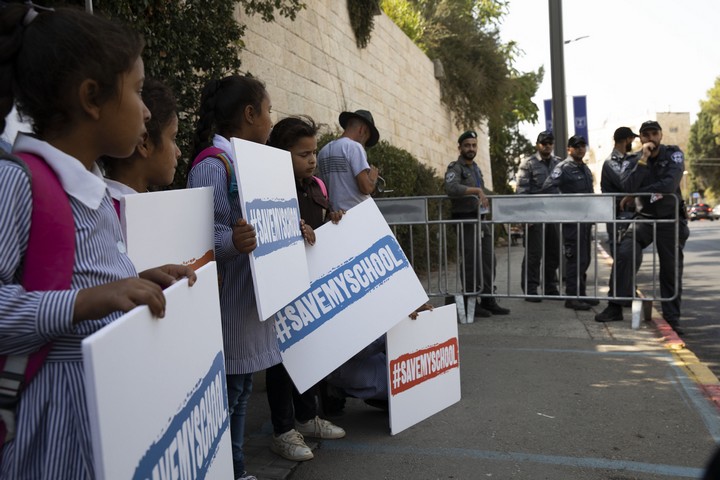Palestinian children from the West Bank Beduin community of Khan al-Ahmar traveled to the Israeli President Reuven Rivlin’s Jerusalem residence on Thursday to protest the imminent demolition of their village.
The roughly 18 kids from Khan al-Ahmar, located just east of Jerusalem between the Judean village of Kafr Adumim and the city of Ma’ale Adumim, were accompanied by Jewish solidarity activists from the United states.
The children held signs that read “Save Our School” in reference to the only school in their area, which is built from mud and tires. They and their Diaspora Jewish supporters were ordered to stay about 100 meters away from the president’s residence.
The people of Khan al-Ahmar are facing a forced expulsion after Israel’s Supreme Court twice decided in favor of demolishing their community.
Judges ruled that the Bedouin Jahalin tribe, originally displaced by Israel from the Negev in 1952, had illegally built Khan al-Ahmar in an unsafe location close to the main highway.
In early July, however, the Supreme Court froze plans to destroy the community, pending an appeal by residents. Israeli security forces and bulldozers had been preparing for the planned demolition, which was set to commence just hours before the court intervened.
Last month, the Supreme Court ruled against the residents, rejecting their claims and clearing the way for Khan al-Ahmar’s destruction.
The community has committed itself to resisting the destruction of its mostly rudimentary shacks, despite the fact that the October 1 deadline for a voluntary evacuation has passed.
Residents and their supporters maintain that the demolition order is politically motivated by a desire to expand the Jewish presence between Kfar Adumim and Ma’ale Adumim.
They have also pointed to the fact that it is near impossible for Palestinians to obtain building permits in the Israeli-controlled areas of the West Bank known as Area C.
According to the Oslo Accords, the West Bank was divided into areas A, B and C, with C constituting over 60% of the territory and being fully controlled by Israel.
While Israel seeks to move the Beduin community to a newly developed neighborhood called Jahalin West, also in Area C, Khan al-Ahmar residents have opposed the move, partially due to the fact that the site is located next to a garbage dump.
Despite desperate appeals by Khan al-Ahmar’s residents, Israeli authorities gave them until Monday October 1 to voluntarily destroy their own homes and relocate. Although the deadline came and went, the village is still standing.
What has been especially unsettling about the struggle surrounding Khan al-Ahmar has been the extent to which Jewish nationalists have expressed support for the demolition, demonstrating how politicized the construction and destruction of homes in the West Bank has become.
Equally disappointing is the fact that Palestinians and their supports rarely oppose the destruction of Jewish communities. Rather than succumb to the trap of an “us versus them” mindset, West Bank Jews and Palestinians should realize that, although our situations are radically different, the injustices both peoples experience often result from the same core issues plaguing Israeli society.
Whether directed against Palestinians or Jews, Israel’s politically-motivated policy of demolishing homes and destroying entire communities stems from the same colonized identity and lack of moral compass that fuels our conflict and keeps us subservient to the West.





